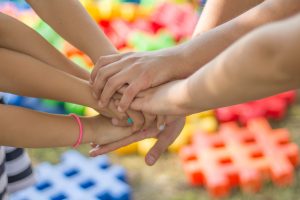
Imitation Game supports the recognition of sociocultural structures in a competence-based school
The pedagogical applications of the imitation game fit well into a competence-based school. Since the autumn 2016, the Finnish National Core Curriculum for basic education associates the general knowledge with skills and preparedness for future, i.e. competences. According to OECD’s DeSeCo (2005), competences are attitudes, knowledge and skills needed for the management of individual tasks and problem solving, including the ability to utilize these in a creative and context-based manner, often in interaction with others. The idea of competences is widely spread in the basic and vocational education, but it is also a part of the lifelong learning.
In the basic education, imitation game is well suited for supporting the recognition of sociocultural structures and the social processes required for group cohesion. Various game setups also help to recognize the multiple viewpoints of any theme, and guide the students to picture themselves in someone else’s shoes.
Game pedagogical methods can be developed for learning of both theoretical knowledge and practical skills. These skills may include interactional abilities and conflict solving, media literacy, formation of personal life goals and the responsibility of the social and ecological environment. The game pedagogical applications raise emotions and produce new experiences for participants, in addition to strengthening the substance knowledge. These practical experiences can be transferred into other learning events as well.
Pedagogical development with trials
The planning and trials proceed in developmental cycles, so that each pilot produces experimental knowledge, feedback and cooperative evaluations, on which to base the further development. The prerequisites for game pedagogical developmental process include multiple game sessions, empirical testing of models and active reflection and assessment from both designers and participants. In the process, we pilot various game setups, which will form data for new types of setups and pedagogical materials for asynchronic participation via open networks.
For real time usage, we will develop a gamified application, in which the students play in groups, each of the classical imitation game roles being played by a group of 2-3 students. Cooperation will require verbalizing the whole process: each team will plan the questions, answers and reactions together, which strengthens metacognitive skills. After the game, the students and teachers will discuss the setup through together. This process adds the benefits of group learning: verbalizing your own thoughts and solving problems in cooperation with others, in addition to the deepened social knowledge within the theme of the game.
Besides a real-time game and online applications, our project estimates the possibility of developing the imitation game into a board game, card game or a table role-playing game, which would strengthen these competences. Moreover, we will develop a tool for pedagogical continuing education to help with the assessment of educational needs; for example, how well the teachers can understand the everyday life of immigrant students, or what kinds of additional skills would be useful in recognizing different talents and supporting various learner types.
Implemented by Otavan Opisto
Tiina Airaksinen, developmental manager, tiina.airaksinen(a)otavanopisto.fi
Heikki Koponen, game pedagog, heikki.koponen(a)otavanopisto.fi

